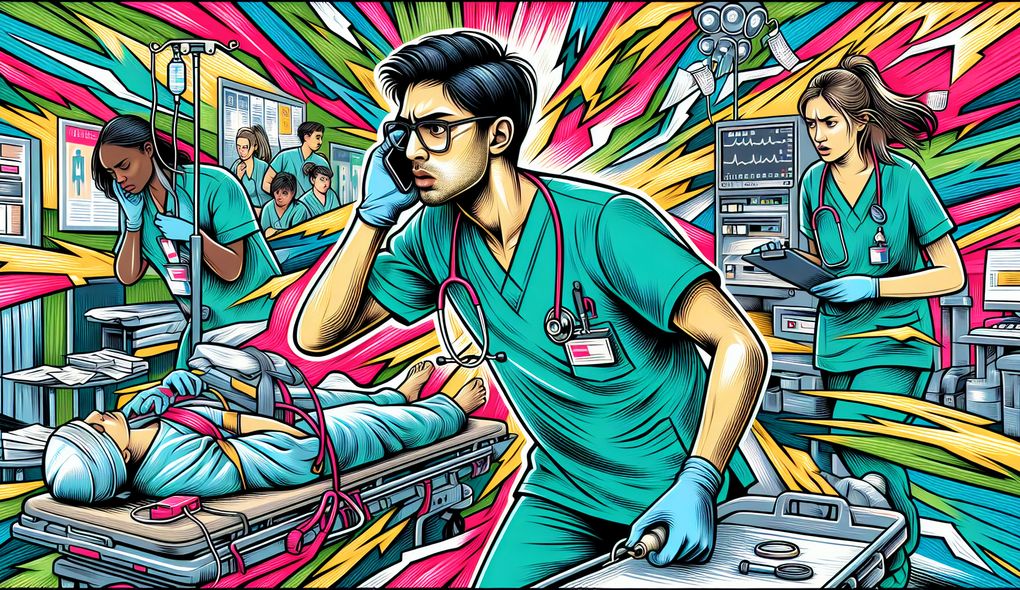What strategies do you use to manage multiple patients with varying degrees of illness or injury?
INTERMEDIATE LEVEL

Sample answer to the question:
To manage multiple patients with varying degrees of illness or injury, I prioritize and organize my workload. I start by assessing the severity of each patient's condition and create a plan of care accordingly. I ensure that critical patients receive immediate attention while also providing timely care to less severe cases. I collaborate closely with the multidisciplinary team to coordinate treatments and interventions. Effective communication is crucial, so I regularly update the healthcare team and patients' families about their status and progress. Additionally, I am proficient in using electronic health records (EHR) systems to efficiently and accurately document patient care.
Here is a more solid answer:
In managing multiple patients with varying degrees of illness or injury, I employ several strategies to ensure efficient and effective care delivery. First, I prioritize patients based on the severity of their condition, using my exceptional assessment and triage skills. This allows me to address critical cases promptly and prevent any further deterioration. I then develop individualized care plans, considering the unique needs of each patient. I also collaborate closely with the multidisciplinary team, communicating effectively to coordinate treatments and interventions. Decision-making under pressure is essential in the emergency room, and I rely on my strong clinical knowledge and experience to make quick and accurate decisions. To facilitate seamless documentation, I am proficient in using electronic health records (EHR) systems, ensuring accurate and up-to-date patient records.
Why is this a more solid answer?
The solid answer expands on the strategies mentioned in the basic answer by providing specific details and examples. It demonstrates the candidate's exceptional assessment and triage skills, the ability to make quick decisions under pressure, effective communication and collaboration, and proficiency in using EHR systems. However, it can still be improved by including more specific experiences and achievements.
An example of a exceptional answer:
When managing multiple patients with varying degrees of illness or injury, I employ a comprehensive approach to ensure optimal care and outcomes. Firstly, I establish a strong foundation by continuously improving my assessment and triage skills through ongoing education and training. This enables me to accurately prioritize patients based on the urgency of their condition. I further enhance efficiency by implementing streamlined processes, such as creating standardized care protocols for common presentations. These protocols not only ensure consistency but also enable effective delegation of tasks to other members of the healthcare team. Moreover, I actively foster communication and collaboration among team members, conducting regular interdisciplinary meetings and huddles to discuss patient progress and adjust care plans as needed. Additionally, I advocate for the implementation and utilization of advanced technology, including AI-driven decision support systems, to aid in decision-making and enhance patient safety. By leveraging electronic health records (EHR) systems, I ensure accurate and thorough documentation, capturing all relevant information in a timely manner. Overall, my focus is on providing compassionate and evidence-based care while maintaining a calm and composed demeanor, even in high-stress situations.
Why is this an exceptional answer?
The exceptional answer goes above and beyond by providing a comprehensive approach to managing multiple patients with varying degrees of illness or injury. It not only demonstrates the candidate's exceptional assessment and triage skills but also highlights their commitment to continuous improvement, efficiency, teamwork, and patient safety. The mention of advanced technology and AI-driven decision support systems shows forward-thinking and adaptability. However, the answer can be strengthened by including specific examples of notable achievements or experiences in each strategy mentioned.
How to prepare for this question:
- Review and enhance your assessment and triage skills by staying updated with the latest evidence-based protocols and guidelines.
- Familiarize yourself with electronic health records (EHR) systems commonly used in emergency departments.
- Practice decision-making under pressure by simulating emergency scenarios and utilizing critical thinking strategies.
- Develop effective communication and interpersonal skills by actively seeking opportunities to collaborate with multidisciplinary teams.
- Stay informed about advancements in emergency nursing, including new technology and best practices.
- Demonstrate your ability to work well in a fast-paced and demanding environment by sharing relevant experiences from past roles.
- Emphasize your compassion, empathy, and commitment to patient-centered care during the interview process.
What are interviewers evaluating with this question?
- Assessment and triage skills
- Decision-making under pressure
- Communication and interpersonal abilities
- Knowledge of electronic health records (EHR) systems

